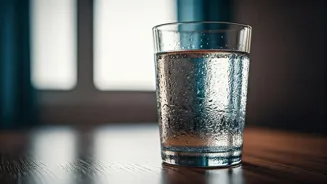The Hydration Headache Link
Headaches, frequently triggered by dehydration, can be eased with sufficient water intake. When the body lacks adequate fluids, brain tissue shrinks, pulling
away from the skull and causing irritation. This often manifests as a dull, throbbing headache, exacerbated by movement. Rehydration restores balance by replenishing lost fluids, enhancing blood circulation, and normalizing the brain’s state, thus alleviating discomfort. Essentially, dehydration headaches signal the body's need for water, not medication.
Study Reveals Benefits
A 2020 study featured in the *Journal of Clinical Neuroscience* focused on women with migraines, highlighting the effects of increased water intake. Researchers found that those who drank more water daily reported: fewer headache days per month; lower pain intensity levels; and shorter durations of migraine attacks. This data shows that hydration functions as both a preventive strategy and a way to manage the problem. Though not a substitute for medication for those with chronic migraines, hydration can make a noticeable difference in how often headaches occur and their severity.
Daily Water Intake
The standard recommendation of 'eight glasses a day' offers a good starting point. Actual water requirements vary based on age, weight, activity levels, and climate. Experts advise sipping water consistently throughout the day, avoiding large, infrequent intakes. For headache relief, drinking a glass of water and waiting 20 to 30 minutes can reveal whether dehydration is the root cause, with pain potentially easing or disappearing without medication. Keeping a water bottle accessible at work or while studying can encourage this practice.
Headache Types
The effectiveness of hydration varies across headache types. Water proves most helpful for dehydration headaches, with relief often occurring quickly after rehydration. Tension headaches can also find relief, as water helps reduce severity. In cases of migraines, hydration may reduce intensity and frequency when combined with other lifestyle changes. However, cluster headaches or those caused by underlying medical conditions are less likely to improve solely through increased water consumption, necessitating professional medical treatment.
Staying Hydrated
There are many methods to stay hydrated and avoid headaches. Begin your day with a glass of water before having coffee or tea. Carry a refillable water bottle everywhere you go. Set reminders on your phone if you often forget to drink. Add natural flavor with lemon or cucumber slices if plain water feels unappealing. Additionally, augment your water intake during exercise or in hot weather to promote hydration and overall well-being.












